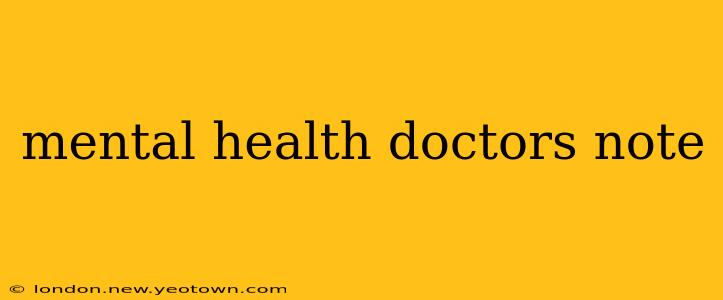Getting a mental health doctor's note can feel like navigating a complex maze. It's a process many find confusing, riddled with questions and concerns about privacy, legality, and what the note will actually say. This guide aims to illuminate the path, sharing insights and answering frequently asked questions.
What is a Mental Health Doctor's Note Used For?
A mental health doctor's note, officially a statement from a licensed mental health professional, serves as documentation of a patient's mental health status. This isn't just a simple piece of paper; it's a formal record that carries significant weight. Its purpose depends entirely on the situation, ranging from supporting a request for time off work to providing evidence for disability benefits. Think of it as a vital piece of evidence, a snapshot of your mental well-being at a specific point in time.
What Information Does a Mental Health Doctor's Note Typically Include?
The information contained within a mental health doctor's note varies depending on its intended purpose. However, most will include some combination of the following:
- Patient's identifying information: Name, date of birth, contact information.
- Date of the note: Crucial for establishing the validity of the information.
- Diagnosis: If applicable, a formal diagnosis will be provided using the Diagnostic and Statistical Manual of Mental Disorders (DSM-5) classification system. However, the level of detail will often depend on the recipient's need-to-know.
- Treatment plan: A brief summary of the current treatment approach, including medication, therapy, or other interventions.
- Functional limitations: This section addresses the impact of the mental health condition on the patient's daily life, work, or school. This is often the most relevant part for requests related to absences or accommodations.
- Recommendations: Specific recommendations based on the patient's current status, perhaps recommending time off, specific workplace accommodations, or other support measures.
- Doctor's signature and contact information: Verifies the legitimacy and allows for follow-up if necessary.
Can I Get a Mental Health Doctor's Note for Work?
Yes, you can certainly request a note from your mental health professional to support a leave of absence or request accommodations at work. However, the specifics of what the note will say depend on the nature of your request and the requirements of your employer. Your doctor will work with you to create a note that's both accurate and appropriate for your situation. Remember, laws protecting employee privacy (like HIPAA in the US) will generally restrict what information your employer can receive.
How Do I Request a Mental Health Doctor's Note?
The best approach is to have an open and honest conversation with your mental health professional. Clearly explain why you need the note and what you intend to use it for. This will allow your doctor to prepare a note that effectively conveys the necessary information while maintaining confidentiality. Be prepared to discuss your treatment plan and the impact of your condition on your ability to perform your responsibilities.
What Are the Legal Implications of a Mental Health Doctor's Note?
Mental health doctor's notes are protected under privacy laws, such as HIPAA in the United States, which limits who can access this sensitive information. Your doctor will only release this information to designated recipients with your express permission. Improper disclosure can lead to serious legal consequences.
Is There a Standard Format for a Mental Health Doctor's Note?
There isn't a single standardized format. However, the information outlined above generally forms the core of most notes. The style and specifics will vary between doctors and the context of the request. Don't hesitate to ask your doctor if you have any questions about the content or format of the note.
This information is for general knowledge and does not constitute medical advice. Always consult with a qualified healthcare professional for any health concerns or before making any decisions related to your health or treatment.

